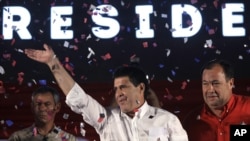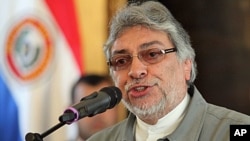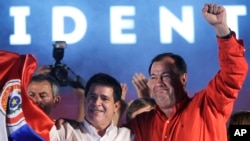ASUNCION —
For Horacio Cartes, a millionaire cigarette and soft drink magnate who won Paraguay's presidential election on Sunday, the challenge now is to run a country where most people can only dream of having a sliver of the wealth he does.
The 56-year-old, who won the election with 46 percent of the vote and will take office in August, campaigned as a center-right conservative at a time when most of Latin America is run by leftists.
Indeed, Cartes has touted a pro-business agenda that includes modernizing the bloated state, which employs about 10 percent of all workers in Paraguay. He also wants to attract up to $2.7 billion in private capital to refurbish Paraguay's airports and build new highways.
Yet Cartes himself has acknowledged that, to be successful, he must also cater to Paraguay's poor masses. Poverty runs near 40 percent and per-capita gross domestic product was just $5,413 in 2011, the second-lowest in South America behind only Bolivia, according to International Monetary Fund data.
The country of 6.6 million has long been one of the region's most politically unstable, with a fragile economy dependent on agriculture. The last elected president, Fernando Lugo, was impeached last year following civil unrest.
"We all want infrastructure, airports, ports, highways, hospitals. But the government will be a failure if we have so many poor people," Cartes told local radio on Sunday.
A political novice who never even voted before 2009, Cartes will have strong support from Congress as well as the political machinery of the center-right Colorado Party, whose 60-year reign was interrupted by Lugo's election in 2008.
On Sunday, the Colorado Party won control of the lower house and 19 of 45 Senate seats, preliminary election results showed. The Liberals had the second-biggest showing and leftist coalitions came in third place, with Lugo elected senator.
Cartes has promised to reform the Colorado Party, infamous for corruption and whose long period in power included General Alfredo Stroessner's 1954-1989 dictatorship.
Nonetheless, analysts think the Colorado Party will try to cling to its system of political patronage and resist changes or job cuts.
"It's very difficult to know what Cartes wants to do," said political analyst Jose Carlos Rodriguez. "In principle, he has a neo-conservative project that gives a strong impulse to private companies and nothing to the state. But there's a major inconsistency there and he'll also have a powerful party that will demand certain benefits."
Notorious for Contraband
Paraguay relies heavily on soybean and beef exports but it is also notorious for contraband trade and money laundering. Growth is seen at 13 percent this year after a severe drought caused a contraction in 2012, according to the central bank.
Land conflicts have intensified in recent years and the small, violent left-wing Paraguayan People's Army operates in northern regions.
In January, the Liberal government took an unprecedented step to tap global debt markets, selling $500 million in 10-year bonds that were nearly 12 times oversubscribed.
Efrain Alegre, the ruling party's presidential candidate, had said he would seek to issue more debt to finance infrastructure. But Cartes has not taken a stance one way or the other.
On Monday, Paraguay's global bond was trading largely steady. A New York-based trader said it was yielding at 4.37 percent, or 26 basis points tighter than when it was first issued at par, but he said the paper was very illiquid.
The leftist bloc is especially strong in the Mercosur trade group, which includes Brazil, Argentina, Venezuela and Uruguay. Mercosur suspended Paraguay in June when Lugo was ousted, arguing the two-day impeachment trial was tantamount to a coup.
Soon after, Mercosur brought in socialist Venezuela even though its inclusion was never approved by Paraguay's Congress.
Cartes told reporters on Sunday that he had already made contacts with Mercosur officials to ensure Paraguay's full return to the group. The presidents of Argentina and Uruguay welcomed Paraguay back into the fold after Cartes' victory.
One of the country's richest men, Cartes primarily made his fortune in the financial and tobacco industries. Rivals tried to link him to drug running and money laundering, but he has never been charged with those crimes and denies any wrongdoing.
Fiona Mackie, Paraguay analyst at The Economist Intelligence Unit research firm, said she did not think Cartes would pursue plans to open airports and state utilities to private investment due to resistance within the Colorado Party.
"That said, a Cartes government would be relatively open to foreign investment in mineral resources," she wrote last week, noting the recent discovery of a major titanium deposit and plans for an aluminum smelter by Rio Tinto Alcan.
The 56-year-old, who won the election with 46 percent of the vote and will take office in August, campaigned as a center-right conservative at a time when most of Latin America is run by leftists.
Indeed, Cartes has touted a pro-business agenda that includes modernizing the bloated state, which employs about 10 percent of all workers in Paraguay. He also wants to attract up to $2.7 billion in private capital to refurbish Paraguay's airports and build new highways.
Yet Cartes himself has acknowledged that, to be successful, he must also cater to Paraguay's poor masses. Poverty runs near 40 percent and per-capita gross domestic product was just $5,413 in 2011, the second-lowest in South America behind only Bolivia, according to International Monetary Fund data.
The country of 6.6 million has long been one of the region's most politically unstable, with a fragile economy dependent on agriculture. The last elected president, Fernando Lugo, was impeached last year following civil unrest.
"We all want infrastructure, airports, ports, highways, hospitals. But the government will be a failure if we have so many poor people," Cartes told local radio on Sunday.
A political novice who never even voted before 2009, Cartes will have strong support from Congress as well as the political machinery of the center-right Colorado Party, whose 60-year reign was interrupted by Lugo's election in 2008.
On Sunday, the Colorado Party won control of the lower house and 19 of 45 Senate seats, preliminary election results showed. The Liberals had the second-biggest showing and leftist coalitions came in third place, with Lugo elected senator.
Cartes has promised to reform the Colorado Party, infamous for corruption and whose long period in power included General Alfredo Stroessner's 1954-1989 dictatorship.
Nonetheless, analysts think the Colorado Party will try to cling to its system of political patronage and resist changes or job cuts.
"It's very difficult to know what Cartes wants to do," said political analyst Jose Carlos Rodriguez. "In principle, he has a neo-conservative project that gives a strong impulse to private companies and nothing to the state. But there's a major inconsistency there and he'll also have a powerful party that will demand certain benefits."
Notorious for Contraband
Paraguay relies heavily on soybean and beef exports but it is also notorious for contraband trade and money laundering. Growth is seen at 13 percent this year after a severe drought caused a contraction in 2012, according to the central bank.
Land conflicts have intensified in recent years and the small, violent left-wing Paraguayan People's Army operates in northern regions.
In January, the Liberal government took an unprecedented step to tap global debt markets, selling $500 million in 10-year bonds that were nearly 12 times oversubscribed.
Efrain Alegre, the ruling party's presidential candidate, had said he would seek to issue more debt to finance infrastructure. But Cartes has not taken a stance one way or the other.
On Monday, Paraguay's global bond was trading largely steady. A New York-based trader said it was yielding at 4.37 percent, or 26 basis points tighter than when it was first issued at par, but he said the paper was very illiquid.
The leftist bloc is especially strong in the Mercosur trade group, which includes Brazil, Argentina, Venezuela and Uruguay. Mercosur suspended Paraguay in June when Lugo was ousted, arguing the two-day impeachment trial was tantamount to a coup.
Soon after, Mercosur brought in socialist Venezuela even though its inclusion was never approved by Paraguay's Congress.
Cartes told reporters on Sunday that he had already made contacts with Mercosur officials to ensure Paraguay's full return to the group. The presidents of Argentina and Uruguay welcomed Paraguay back into the fold after Cartes' victory.
One of the country's richest men, Cartes primarily made his fortune in the financial and tobacco industries. Rivals tried to link him to drug running and money laundering, but he has never been charged with those crimes and denies any wrongdoing.
Fiona Mackie, Paraguay analyst at The Economist Intelligence Unit research firm, said she did not think Cartes would pursue plans to open airports and state utilities to private investment due to resistance within the Colorado Party.
"That said, a Cartes government would be relatively open to foreign investment in mineral resources," she wrote last week, noting the recent discovery of a major titanium deposit and plans for an aluminum smelter by Rio Tinto Alcan.










